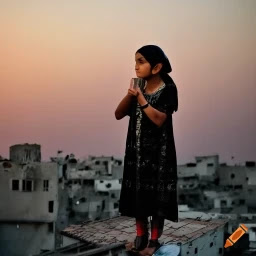Amira sat on the rooftop of her modest home in Gaza, her fingers gently stroking the feathers of a small injured bird. The world around her was engulfed in chaos, with the constant sound of gunfire and explosions echoing through the narrow streets. Food shortages plagued her community, and despair hung thick in the air. Yet, in the midst of this turmoil, Amira found solace in the simple act of caring for the bird.
Her journey of nurturing the fragile creature soon found its way online. Amira began sharing her daily updates, her words and images reaching people far beyond the borders of Gaza. Her story of empathy and resilience struck a chord, inspiring a global community dedicated to small acts of kindness. Donations for animal care supplies started pouring in, and people from different corners of the world sent messages of support and love.
While Amira’s online presence grew, the world outside continued to grapple with its own complexities. In another part of the globe, a gym chain’s decision to adopt inclusive policies ignited a fierce backlash. The controversy highlighted the broader societal challenges of fostering empathy and acceptance. Meanwhile, on the international stage, significant political shifts were underway. Ireland, Spain, and Norway announced their plans to officially recognize Palestine, effective May 28. This decision, aimed at promoting peace in the Middle East, was met with mixed reactions. Palestinian officials welcomed the move, seeing it as a step toward recognition and coexistence. Conversely, Israeli leaders condemned it, viewing it as a one-sided gesture that overlooked the complexities of their situation.
As these events unfolded, Amira’s simple act of kindness stood in stark contrast, underscoring the profound impact of individual actions. Her story illuminated the enduring power of empathy and compassion to inspire change and hope, even in the face of global conflicts.
In the United States, public opinion about the ongoing Israel-Hamas war was deeply divided. A survey conducted by the Pew Research Center revealed that while 58% of Americans believed Israel’s reasons for fighting Hamas were valid, opinions about how Israel conducted its military actions were more mixed. Only 38% found Israel’s methods acceptable, and a significant portion, 34%, deemed them unacceptable. Views on Hamas were even more critical, with only 5% of Americans finding Hamas’ actions acceptable.
The survey also highlighted a significant disengagement among the American public, with only 22% closely following the news about the war. Many Americans were unsure about the specifics, including the war’s potential impact on the creation of an independent Palestinian state. Despite this, the views of Jewish and Muslim Americans provided a more nuanced perspective. An overwhelming majority of U.S. Jews (89%) saw Israel’s reasons for going to war as valid, while only 18% of U.S. Muslims agreed. Conversely, nearly half of U.S. Muslims (49%) found Hamas’ reasons for fighting valid, compared to a mere 16% of U.S. Jews.
Amira’s story, set against the backdrop of these global and national events, emphasized the significant role of empathy in our world. Her care for an injured bird and the subsequent ripple effect of her actions showcased how individual kindness could bridge divides and inspire broader societal change. Amidst the political turmoil and conflicting opinions, Amira’s narrative reminded us of the simple yet profound impact one person can have through acts of compassion and love.
Majority in U.S. Say Israel Has Valid Reasons for Fighting; Fewer Say the Same About Hamas

Comments